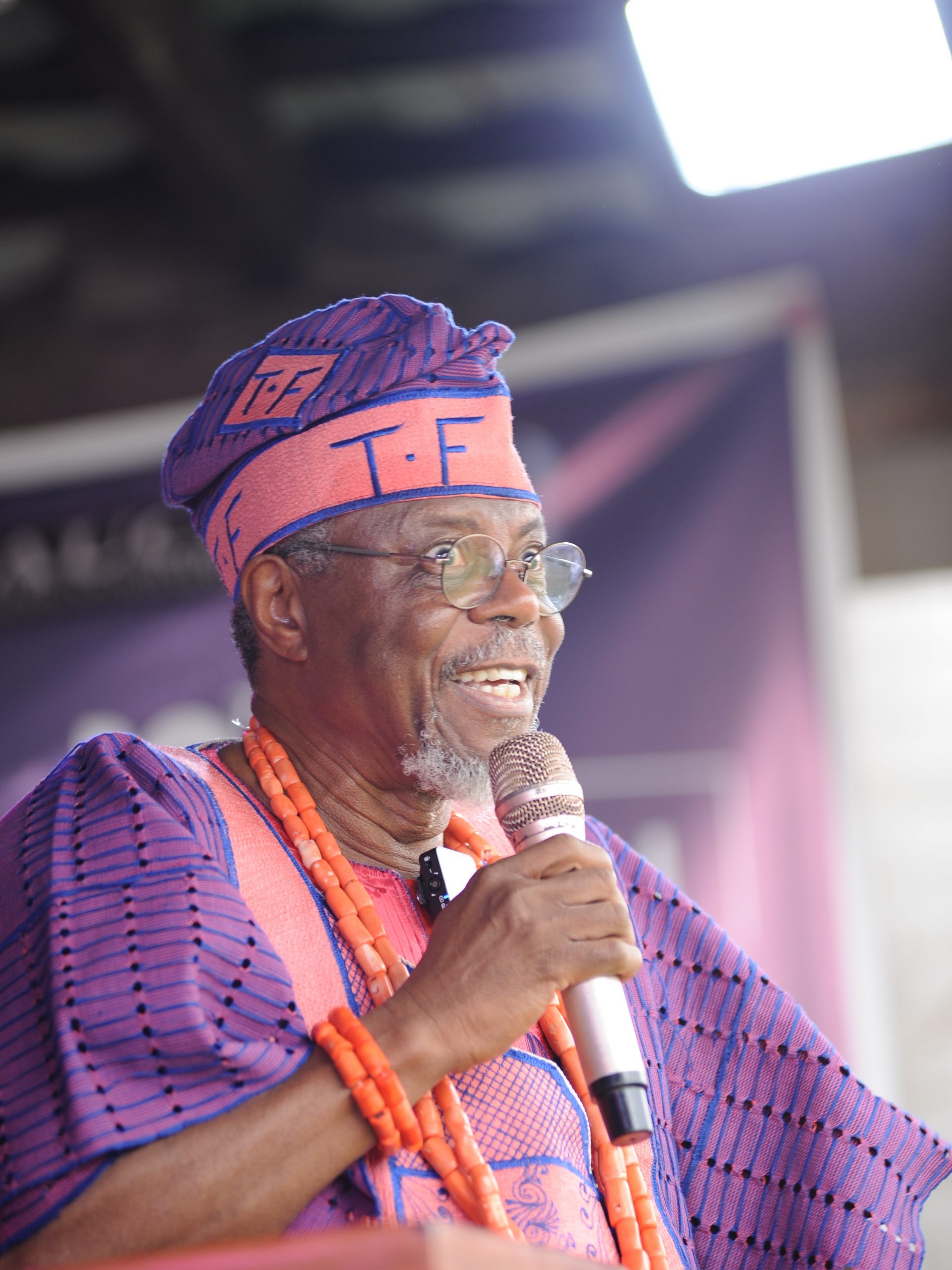By Toyin Falola
(The Slogan Series)
My name is Toyin Falola, and I am an active member of the Association of Nigerian Pregnant Men (ANPM). We eat and drink every evening at our clubhouse. You can tell from the size of my stomach that I don blow. The Secretary of ANPM, a chief with a stomach twice as big as mine, don blow pass me. He is well connected that he can invite ten governors in the country to attend our annual gala. Men who don blow, as well as elegant don blow first ladies, honour us. Their drivers sit inside their cars, praying to become like us while they receive free AC to calm their bodies wey too dey hot. The Secretary and I look smallish than our Vice-President, who finds it difficult to climb into his jeep because he don blow well well.
Our President, our Oga patapata at the top, lives in affluence. I don’t know why I am afraid of him. He too get power! Plenty plenty power!! Whenever the President falls asleep, small girls steal from his wallet, and he does not even notice it. Sometimes I fear for the girls. What if one of them gets unlucky one day, and Oga wakes up to catch her in the act? But the girls seem not to send. They want a way out of their sapa situation. They steal from magas like my President, use the money to finance their japa plans, then some weeks after they get to the abroad, they post pictures on social media, and a barrage of comments follow: See as you fresh like today bread! Omo, you don blow!
If you are not a street guy like me or unfamiliar with the language of the street and slang, you might find all the slang phrases in the preceding paragraphs unusual. Communication and language are two interdependent concepts that hardly exist separately. Language is ineffective if it cannot communicate with another person. The indigenous languages of the regions that subsequently became Nigeria are very different from what the colonialists imagined them to be. The notion that Africa was a “dark continent” before European contact has been refuted and proven false by scholars and through our cultural developments even after independence. Before colonialism, Africans were not only able to communicate, but they also used complex languages to interact with one another and with events.
However, culture is not static, and one of its characteristics is the capacity to adapt to new situations and times. For context, words are borrowed from one language into another. For example, the Yoruba call onions alubosa, a Hausa word. The creation of Pidgin English, which deviates from the native English language and is increasingly common in other Anglophone-speaking West African countries, might be attributed to acculturation and the desire to improve communication and make languages simpler.
Even though the term “you don blow” is derived from the English language, it can be used in various contexts. Three words, three ideas. The pronoun “you” is used to directly address the listener or refer to individuals in general. The word “don” can be used in the present, past, or future tenses in pidgin English to replace the words “have, had, or has.” Examples are I don go (I have gone) and I don chop (I have eaten). The last word in the phrase You don blow can refer to either expanding air from one’s mouth or destruction by an explosion.
Nigeria boasts of an abundance of highly skilled and noteworthy people. The country is recognized as a talent hotspot in many spheres of human endeavour, including entertainment. Despite the challenging circumstances militating against young and brilliant individuals and inadequate leadership and infrastructure for nurturing such talents and people to develop and build the nation, Nigerian youth have been breaking through to international spotlights. These exceptional ones work as hard as they can with the limited resources at their disposal to achieve success and greatness, and when they finally do, dem don blow.
Let me further take you there. If someone says to you on the street, You don blow, it can be for various reasons. For those of us who are street kings, the first thing that will come to mind is that we have succeeded, and are now famous, trending, or the rave of the moment. This is well-versed in the entertainment field. Being famous or trending in the entertainment industry is associated with wealth and success due to the perks that come with it, such as sponsorship deals and money from social media engagements. Therefore, when an entertainer from a lowly background becomes well-known, he don blow. Olamide Adedeji, better known by his stage name “Badoo”, is a Nigerian rap artiste born and raised in Bariga, Lagos. He is just one example of a musician who has succeeded and become a global name despite coming from a lowly background. When next you see Don Jazzy, Badoo, Davido, Wizkid, and Burnaboy, greet them well well as dem don blow pass you.
Do you know some people believe you can hardly blow in the village? This is why people who live in rural or village settings find all means necessary to move to the big cities, even if they have to live in the “trenches” before they blow. The population of Nigeria’s major cities, such as Lagos, has exploded because many people, especially young Nigerians, believe that moving to an urban area is the first indication of success or achievement. Blow.
Another strategy that Nigerians believe will help them blow is to japa, our new alubarika. Due to the widespread problems affecting the country, such as unemployment, insecurity, and financial hardship, Nigeria is facing a brain drain in all sectors as young and older people emigrate. As a street person, you might think someone don blow if you hear they have relocated abroad or have gone to study abroad. Japa can make you blow, even bloat you! If you can successfully navigate the immigration process to leave the country, you’re good to go. Two months after you land in Saskatchewan or Houston, you have acquired a Highlander. Take many photos and post them on Facebook, include some Instagram videos or jump on some Tiktok trends, and you don blow!
You can blow a matter with your big mouth. This indicates that a secret has been revealed or that more people are now aware of an issue that only a few people were meant to be privy to. If such happens, it means the matter don blow. To blow in academia is to become a big brand and a well-established scholar, winning grants and carving a niche for yourself in research and other academic engagements. Professor don blow. If you become a Vice-Chancellor, you don blow pass all others! Shey VC wa kere ni!?
However, to blow in Nigeria, you need “grace”, which has been attributed to providence or blessings from God. Even if dem cut soap for you, you fit no blow if babu grace. In such a situation, keep at your hustle and be grateful for each day because, as Asake sang in “Dupe”, “cause you no get today no mean e too far” (https://youtu.be/sWj-zEuH4Lg). Relax, you sef go soon blow, and when you do, just play over and over Kizz Daniel’s “RTID” for thanksgiving: https://youtu.be/ElgKinpsqYI.
 Kizz Daniel
Kizz Daniel


